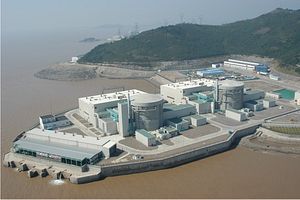China’s declaration of a “war on pollution” sparked a drastic up-swing in Chinese investment in alternative energy sources, including solar, wind, and hydropower. But among all these clean energy options, nuclear energy in particular has caught Beijing’s eye — even as Chinese citizens themselves remain deeply uneasy about the safety of nuclear power in the post-Fukushima era.
China is in the midst of a serious push to expand its nuclear power industry. In Li Keqiang’s 2014 government work report, he mentioned nuclear power as among the alternative energy sources being actively pursued to lessen reliance on fossil fuels. Li’s passing reference to nuclear energy hardly did justice to the scope of the expansion. According to CCTV, there are currently 28 nuclear power plants under construction in China, compared to the 20 plants that are operational at the moment. Beijing plans to have China’s nuclear-generating capacity rise to 88 gigawatts by 2020, representing nearly a 80 percent increase from current capacity. By 2050, China hopes to have 400-500 giagwatts of nuclear capacity – 100 times more than it has now.
What’s driving the push for nuclear power? As the DC-based Wilson Center’s China Environment Forum points out, nuclear power is considered to be crucial in China’s quest to decrease its reliance on coal, a major cause of China’s air pollution problems. Experts expect China’s 13th five year plan (to cover the period from 2016 to 2020) to focus heavily on clean energy as China seeks a “green” economy. Increased investments in nuclear energy have come along similar booms in solar and wind energy, sectors in which China is world’s second and first largest producer respectively. But compared to other green energy fields, nuclear power has a special draw for local government leaders, who embrace the intensive construction and operating processes as major job creators for their regions.
Nuclear technology is also a sector earmarked by the Chinese government as a target field for indigenous research and innovation. According to comments made in September by National Energy Administration director Wu Xinxiong, China hopes to be a world leader in nuclear power in 2020 by pursuing technological breakthroughs in current nuclear technology. As a high-tech industry, nuclear power has become a focal point for Chinese leaders seeking international recognition of the Chinese “brand.” Nuclear power for Beijing is a nexus of clean energy, economic incentives, and international prestige.
As part of this international branding effort, China is increasingly seeking to market its nuclear power technology abroad. China will provide $6.5 billion in funding for nuclear power reactors in Pakistan and is also involved in a joint funding and construction deal in Romania. On his recent trip to India, Xi Jinping raised the possibility of Chinese investment in India’s civil nuclear industry. In one of the greatest coups for China’s nuclear exports, Beijing and London signed a deal in June that will allow Chinese companies to own and operate Chinese-designed nuclear plants in the U.K.
But all this progress takes place amid public concern. Even the Chinese government was spooked by the 2011 Fukushima nuclear disaster in Japan. Beijing responded with a temporary moratorium on the construction of new nuclear plants and instituted a new round of safety inspections. But the Fukushima disaster ultimately did not deter Beijing from its nuclear power push; the moratorium was raised in October 2012 and the Chinese government continues to have ambitious goals for expanding nuclear power.
The Chinese public, however, is far more hesitant. The Fukushima disaster irrevocably shaped Chinese opinions on nuclear safety. As a result, the expansion of Chinese nuclear power has been accompanied by anti-nuclear protests from concerned local populations. As chinadialogue outlines, there’s even been vocal dissent from influential Chinese experts such as He Zuoxiu from the Chinese Academy of Sciences and Wang Yinan from the Development Research Center. Wang and He are particularly concerned about the safety of nuclear power plants in China’s earthquake-prone inland regions — the same regions where nuclear plant construction is booming.
For Beijing, nuclear power is a useful tool for achieving several of China’s development goals. Nuclear energy can decrease China’s reliance on fossil fuels, which is important for environmental as well as strategic reasons. Meanwhile, China is investing both time and money into making a name for itself as a technological leader in nuclear energy. But public opposition needs to be carefully managed, especially at the local level, lest the specter of Fukushima derail China’s nuclear power gambit.

































